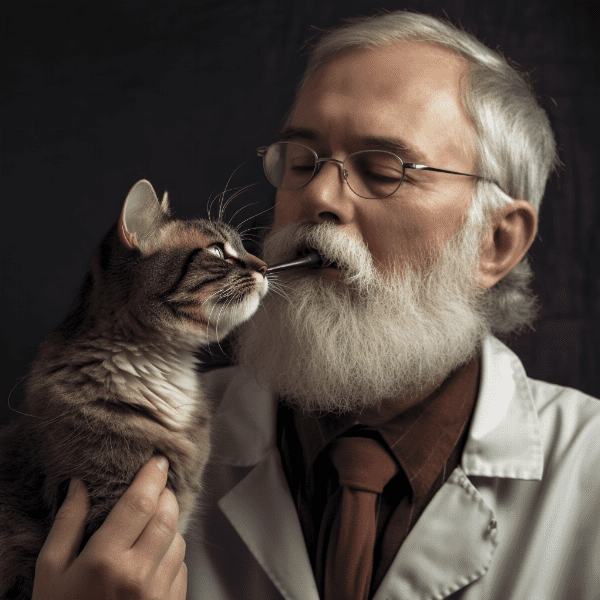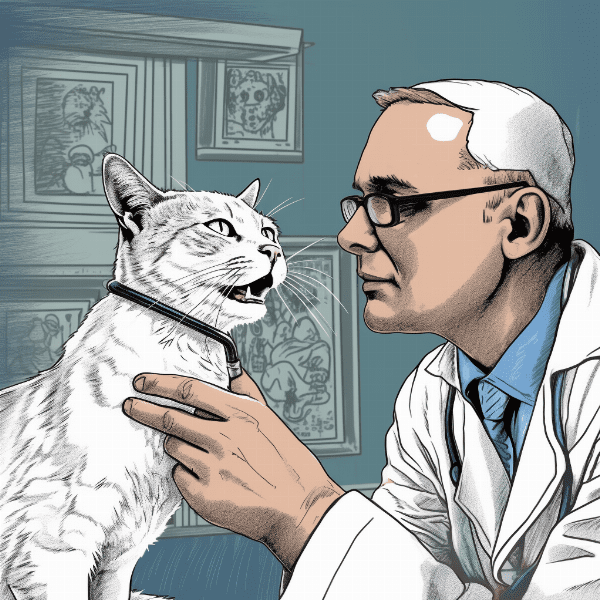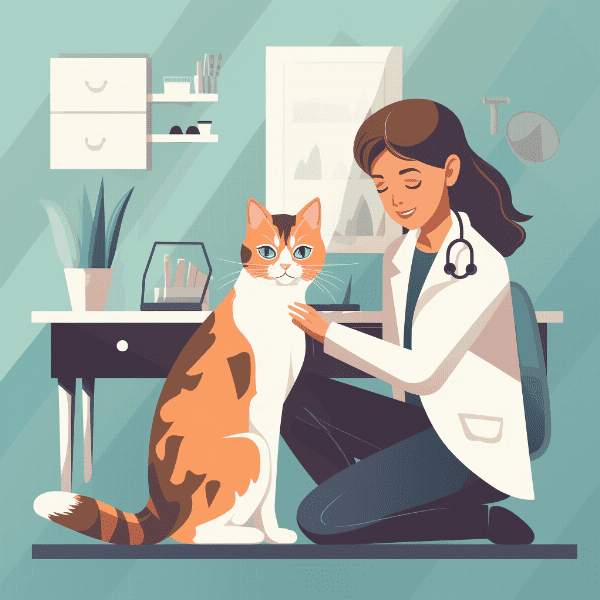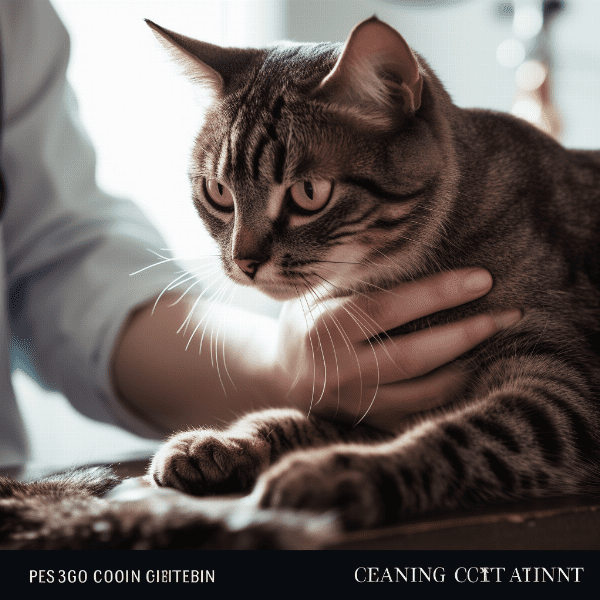Table of Contents
- Understanding Oral Cancer in Cats
- Common Causes of Oral Cancer in Cats
- Recognizing the Warning Signs of Oral Cancer
- Diagnosis and Treatment Options for Feline Oral Cancer
- Prognosis and Long-Term Management for Cats with Oral Cancer
- Preventing Oral Cancer in Cats: Tips and Strategies
- Coping with the Emotional Impact of a Feline Cancer Diagnosis
- Resources and Support for Cat Owners Dealing with Oral Cancer
- The Importance of Regular Veterinary Check-Ups for Cats
- Advocating for Feline Cancer Awareness and Research
Understanding Oral Cancer in Cats
Oral cancer is a type of cancer that affects the tissues of the mouth and throat. It can occur in cats of all ages, but it is more common in older cats. The exact cause of Oral cancer in cats is not known, but there are several factors that may increase a cat’s risk of developing this disease.
How Does Oral Cancer Develop?
Oral cancer in cats can develop in different parts of the mouth, including the tongue, gums, roof of the mouth, and back of the throat. It usually starts as a small growth or sore, which can be difficult to detect in the early stages. Over time, the growth can become larger and more aggressive, eventually spreading to other parts of the body.
- Age: Oral cancer is more common in older cats, typically those over 10 years of age.
- Gender: Male cats are more likely to develop oral cancer than female cats.
- Breed: Certain breeds, such as Siamese and Abyssinian cats, may be more prone to developing oral cancer.
- Environmental factors: Exposure to secondhand smoke or other environmental toxins may increase a cat’s risk of developing oral cancer.
Symptoms of Oral Cancer in Cats
The symptoms of oral cancer in cats can vary depending on the location and severity of the cancer. Some common signs to watch for include:
- Bad breath
- Drooling
- Difficulty eating or swallowing
- Weight loss
- Swelling or lumps in the mouth or throat
- Bleeding from the mouth
- Changes in the cat’s meow or voice
The Importance of Early Detection
Early detection of oral cancer in cats is crucial for successful treatment and long-term management of the disease. Regular dental check-ups and routine veterinary exams can help detect oral cancer in its early stages, increasing the chances of successful treatment and a positive prognosis.
By understanding the risk factors and symptoms of oral cancer in cats, pet owners can take proactive steps to protect their feline companions and ensure they receive the best possible care.

Common Causes of Oral Cancer in Cats
The exact cause of oral cancer in cats is not fully understood, but there are several factors that may contribute to its development. Understanding these risk factors can help pet owners take steps to prevent oral cancer in their cats.
Genetic Predisposition
Some cats may be genetically predisposed to developing oral cancer. Certain breeds, such as Siamese and Abyssinian cats, have been found to have a higher incidence of oral cancer than other breeds. However, genetics alone are not enough to cause cancer, and environmental factors also play a role.
Environmental Factors
Exposure to environmental toxins and other risk factors may increase a cat’s risk of developing oral cancer. These can include:
- Secondhand smoke: Cats living in homes with smokers have a higher risk of developing oral cancer.
- Chemical exposure: Exposure to chemicals such as pesticides and industrial solvents may increase a cat’s risk of developing cancer.
- Chronic inflammation: Chronic inflammation in the mouth, often caused by poor dental hygiene, can increase the risk of oral cancer.
Viral Infections
Some viruses have been linked to the development of oral cancer in cats. The feline leukemia virus (FeLV) and feline immunodeficiency virus (FIV) have both been associated with an increased risk of oral cancer. Cats that are not vaccinated against FeLV are at a higher risk of developing this type of cancer.
Age and Gender
As with many types of cancer, oral cancer is more common in older cats. Male cats are also more likely to develop oral cancer than females.
Conclusion
While the exact cause of oral cancer in cats is not known, several factors may increase a cat’s risk of developing this disease. Pet owners can take steps to reduce their cat’s risk of oral cancer by providing a healthy environment, regular veterinary care, and maintaining good dental hygiene. Early detection is also key to successful treatment and management of this disease.

Recognizing the Warning Signs of Oral Cancer
Physical Signs of Oral Cancer
There are several physical signs of oral cancer that pet owners should be aware of, including:
- Lumps or bumps in the mouth or throat
- Sores or ulcers that do not heal
- Bleeding from the mouth
- Swelling or thickening of the gums, tongue, or other parts of the mouth
- Difficulty eating or swallowing
- Weight loss
- Bad breath
- Changes in the cat’s meow or voice
Behavioral Changes
In addition to physical signs, cats with oral cancer may also exhibit behavioral changes such as:
- Drooling excessively
- Avoiding food or water
- Hiding or withdrawing from social interaction
- Exhibiting signs of pain, such as vocalization or reluctance to be touched
If you notice any of these warning signs in your cat, it’s important to schedule an appointment with your veterinarian as soon as possible.
The Importance of Regular Veterinary Check-Ups
Regular veterinary check-ups are essential for the early detection and treatment of oral cancer in cats. During a routine exam, your veterinarian will check your cat’s mouth for any signs of cancer or other oral health issues. They may also recommend regular dental cleanings to prevent the development of oral cancer and other dental problems.
Conclusion
Recognizing the warning signs of oral cancer in cats is essential for prompt diagnosis and treatment. By keeping an eye out for physical and behavioral changes in your cat, you can help ensure that they receive the care they need to manage this disease. Regular veterinary check-ups and dental cleanings can also help reduce the risk of oral cancer and other oral health issues in cats.

Diagnosis and Treatment Options for Feline Oral Cancer
If your cat is showing signs of oral cancer, it’s important to schedule an appointment with your veterinarian as soon as possible. Early diagnosis and treatment can increase the chances of a positive outcome for your cat.
Diagnosis
To diagnose oral cancer in cats, your veterinarian will perform a thorough physical exam and may recommend additional tests, such as:
- Biopsy: A tissue sample is taken from the affected area and examined under a microscope to determine if cancer is present.
- X-rays: X-rays can help identify the extent of the cancer and determine if it has spread to other parts of the body.
- Blood work: Blood tests can help identify any underlying health conditions that may affect treatment.
Treatment Options
The treatment options for feline oral cancer depend on the type, location, and extent of the cancer, as well as the overall health of the cat. Some common treatment options include:
- Surgery: Surgery may be recommended to remove the cancerous growth and any surrounding tissue. In some cases, a portion of the jaw or tongue may need to be removed as well.
- Radiation therapy: Radiation therapy may be used to shrink the cancerous tumor and reduce pain.
- Chemotherapy: Chemotherapy may be recommended to treat cancer that has spread to other parts of the body.
Prognosis and Long-Term Management
The prognosis for feline oral cancer depends on several factors, including the type and stage of the cancer, as well as the overall health of the cat. Cats with early-stage oral cancer that is treated promptly may have a good prognosis, while cats with more advanced cancer may have a more guarded prognosis.
Conclusion
Diagnosis and treatment of feline oral cancer requires prompt veterinary care and a tailored treatment plan based on the individual needs of your cat. By working closely with your veterinarian, you can help ensure that your cat receives the best possible care and management for this disease.

Prognosis and Long-Term Management for Cats with Oral Cancer
The prognosis for cats with oral cancer depends on several factors, including the type and stage of the cancer, as well as the overall health of the cat. While a diagnosis of oral cancer can be devastating for cat owners, there are treatment options available that can help manage the disease and improve the cat’s quality of life.
Prognosis
The prognosis for feline oral cancer varies depending on the type and stage of the cancer. Cats with early-stage cancer that is treated promptly may have a good prognosis, while cats with more advanced cancer may have a more guarded prognosis. Factors that can affect prognosis include the location of the cancer, the cat’s age and overall health, and whether the cancer has spread to other parts of the body.
Long-Term Management
Long-term management of feline oral cancer may involve ongoing veterinary care and monitoring for signs of recurrence. Your veterinarian may recommend regular check-ups and imaging tests to monitor the cancer and ensure that it has not returned. They may also recommend changes to your cat’s diet or lifestyle to support their overall health and well-being.
In addition, it’s important to monitor your cat’s behavior and quality of life. Cats with oral cancer may experience pain or discomfort, which can affect their appetite, energy levels, and overall mood. Your veterinarian can provide guidance on managing your cat’s pain and supporting their emotional well-being.
Coping with the Emotional Impact
A diagnosis of oral cancer can be emotionally challenging for cat owners. It’s important to seek support from family, friends, and veterinary professionals as you navigate this difficult time. Your veterinarian may be able to provide resources for support groups or counseling services for pet owners.
Conclusion
While a diagnosis of oral cancer in cats can be devastating, there are treatment options available that can help manage the disease and improve the cat’s quality of life. Ongoing veterinary care, monitoring, and support are essential for long-term management of this disease. By working closely with your veterinarian and seeking support from others, you can help ensure the best possible outcome for your cat.

Preventing Oral Cancer in Cats: Tips and Strategies
While not all cases of feline oral cancer can be prevented, there are several steps that pet owners can take to reduce their cat’s risk of developing this disease. By providing a healthy environment and taking proactive steps to maintain your cat’s oral health, you can help protect your feline companion from oral cancer.
Regular Veterinary Care
Regular veterinary care is essential for maintaining your cat’s overall health and preventing the development of oral cancer. Annual check-ups can help identify any early signs of cancer or other oral health issues, and routine dental cleanings can help remove plaque and tartar buildup, reducing the risk of oral cancer.
Good Dental Hygiene
Good dental hygiene is key to preventing oral cancer in cats. Brushing your cat’s teeth regularly can help remove food particles and bacteria that can contribute to the development of cancer. Your veterinarian can recommend safe and effective dental care products for your cat, such as toothbrushes, toothpaste, and oral rinses.
Healthy Diet and Lifestyle
Providing your cat with a healthy diet and lifestyle can also help reduce their risk of developing oral cancer. Feeding your cat a balanced diet that is rich in nutrients can support their overall health and immune system, reducing the risk of cancer. Additionally, reducing your cat’s exposure to environmental toxins, such as secondhand smoke, can also help protect their oral and overall health.
Early Detection
Early detection is key to successful treatment and management of oral cancer in cats. As a pet owner, it’s important to be familiar with the warning signs of oral cancer and to seek veterinary care promptly if you notice any changes in your cat’s oral health.
Conclusion
Preventing oral cancer in cats requires a combination of regular veterinary care, good dental hygiene, a healthy diet and lifestyle, and early detection. By taking proactive steps to maintain your cat’s oral and overall health, you can help reduce their risk of developing this disease and ensure they receive the best possible care if they are affected.

Coping with the Emotional Impact of a Feline Cancer Diagnosis
A diagnosis of feline cancer can be emotionally challenging for pet owners. Coping with the diagnosis and managing your cat’s care can be stressful and overwhelming. It’s important to seek support and resources to help you navigate this difficult time.
Understanding Your Emotions
It’s normal to experience a range of emotions when your cat is diagnosed with cancer, including shock, fear, anger, and sadness. These emotions can be intense and overwhelming, and it’s important to acknowledge and express them in healthy ways. Talk to a trusted friend or family member, or consider seeking support from a mental health professional.
Communicating with Your Veterinarian
Clear communication with your veterinarian is key to managing your cat’s care and coping with the emotional impact of their diagnosis. Ask your veterinarian to explain the diagnosis and treatment options in detail, and don’t hesitate to ask questions or express your concerns. Your veterinarian can also provide resources for support and counseling for pet owners.
Seeking Support
Seeking support from others who have experienced similar situations can be helpful for coping with the emotional impact of a feline cancer diagnosis. Consider joining a support group or online forum for pet owners who are dealing with feline cancer. These groups can provide a safe space to share your feelings and experiences, and to receive advice and support from others who understand what you are going through.
Self-Care
Managing your cat’s care can be time-consuming and stressful, but it’s important to prioritize self-care as well. Take time for yourself to engage in activities that bring you joy and relaxation, such as exercise, meditation, or spending time with friends and family. Don’t hesitate to ask for help or support from others if you need it.
Conclusion
Coping with the emotional impact of a feline cancer diagnosis can be challenging, but there are resources and support available to help you navigate this difficult time. Clear communication with your veterinarian, seeking support from others, and prioritizing self-care can all help you manage your emotions and provide the best possible care for your cat.

Resources and Support for Cat Owners Dealing with Oral Cancer
Dealing with a feline cancer diagnosis can be overwhelming for pet owners. Fortunately, there are resources and support available to help you manage your cat’s care and cope with the emotional impact of their diagnosis.
Veterinary Care
Your veterinarian is your best resource for managing your cat’s care and treatment for oral cancer. They can provide guidance on treatment options, monitor your cat’s progress, and offer support and advice for managing your cat’s pain and overall well-being.
Support Groups and Counseling
Joining a support group or seeking counseling can be helpful for coping with the emotional impact of a feline cancer diagnosis. Many veterinary clinics offer support groups or counseling services for pet owners, or can provide referrals to local resources. Online forums and social media groups can also provide a safe space for pet owners to connect and share their experiences.
Financial Assistance
The cost of cancer treatment for cats can be significant, and many pet owners struggle to afford the necessary care. Fortunately, there are several organizations that provide financial assistance for pet owners dealing with the cost of cancer treatment. These organizations may offer grants, loans, or other forms of assistance to help cover the cost of veterinary care.
Educational Resources
Educational resources can help pet owners learn more about feline oral cancer, treatment options, and other related topics. Veterinary clinics and organizations such as the American Association of Feline Practitioners (AAFP) may offer educational materials and resources for pet owners.
Conclusion
Dealing with a feline cancer diagnosis can be challenging, but there are resources and support available to help pet owners manage their cat’s care and cope with the emotional impact of their diagnosis. From veterinary care to support groups and financial assistance, there are many resources available to help pet owners provide the best possible care for their feline companions.

The Importance of Regular Veterinary Check-Ups for Cats
Regular veterinary check-ups are essential for maintaining your cat’s overall health and well-being. These check-ups can help identify any health issues or potential problems before they become more serious, and can also provide an opportunity for your veterinarian to offer guidance on preventive care and management.
Early Detection of Health Issues
Regular veterinary check-ups can help identify health issues in your cat before they become more serious. During a routine exam, your veterinarian will check your cat’s vital signs, examine their eyes, ears, mouth, and skin, and may recommend additional tests, such as blood work or urinalysis. These tests can help detect early signs of health issues, such as kidney disease, diabetes, or thyroid problems, allowing for prompt treatment and management.
Preventive Care
In addition to early detection, regular veterinary check-ups can also provide an opportunity for preventive care. Your veterinarian may recommend vaccinations, parasite prevention, dental cleanings, or other preventive measures to help keep your cat healthy and free from disease.
Management of Chronic Conditions
For cats with chronic conditions such as oral cancer, regular veterinary check-ups are essential for ongoing management and monitoring. Your veterinarian can offer guidance on managing your cat’s symptoms and pain, as well as monitoring the progression of their disease.
Partnership with Your Veterinarian
Regular veterinary check-ups also allow for a partnership between you and your veterinarian in managing your cat’s care. Your veterinarian can offer guidance on nutrition, behavior, and other aspects of your cat’s overall health, and can provide support and resources for managing any health issues that arise.
Conclusion
Regular veterinary check-ups are essential for maintaining your cat’s overall health and well-being. These check-ups allow for early detection of health issues, preventive care, management of chronic conditions, and a partnership with your veterinarian in managing your cat’s care. By prioritizing regular veterinary check-ups, you can help ensure that your cat receives the best possible care and support for a happy and healthy life.

Advocating for Feline Cancer Awareness and Research
Feline cancer is a serious health issue that affects many cats and their families. Advocating for feline cancer awareness and research can help raise awareness about this disease, promote early detection and treatment, and support ongoing research to improve treatment options and outcomes.
Raising Awareness
Raising awareness about feline cancer is an important step in promoting early detection and treatment. Pet owners can help raise awareness by sharing information about feline cancer with friends and family, participating in local events or fundraisers, and supporting organizations that promote feline health and cancer research.
Supporting Cancer Research
Supporting cancer research is another important way to advocate for feline cancer awareness and treatment. Many organizations, such as the Morris Animal Foundation and the American Association for Cancer Research, fund research into feline cancer and other diseases. Donating to these organizations or participating in fundraising events can help support ongoing research and development of new treatment options.
Petitions and Advocacy
Petitions and advocacy efforts can also help raise awareness and promote change in feline cancer research and treatment. Pet owners can sign petitions or contact their elected officials to advocate for increased funding for cancer research, support for feline health initiatives, and other related issues.
Conclusion
Advocating for feline cancer awareness and research is an important way to support the health and well-being of cats and their families. Raising awareness, supporting cancer research, and participating in advocacy efforts can all help promote early detection and treatment, support ongoing research, and improve outcomes for cats with cancer. By working together to raise awareness and support research, we can help ensure a brighter future for cats and their families.




